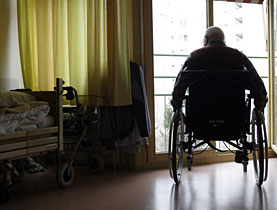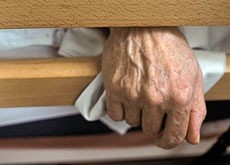Vaud debates assisted suicide in nursing homes

All state-subsidised old people's homes in canton Vaud may be obliged to open their doors to the controversial practice of assisted suicide.
The assisted suicide organisation Exit, which already helps terminally ill patients in a number of nursing homes, has launched a people’s initiative to force a local debate on the issue – a Swiss first.
Swiss law tolerates assisted suicide when patients commit the act themselves and helpers have no direct interest in their death. Switzerland has five assisted suicide organisations, which help around 350 people each year.
In 2007 Exit carried out 245 assisted suicides by Swiss or foreign nationals living in Switzerland. Exit assists only Swiss residents and usually goes to them in their own homes.
But Lausanne and Geneva university hospitals and several nursing homes also allow assisted suicide on their premises. Out of the 66 assisted suicides in French-speaking Switzerland last year, five took place in old people’s homes.
Jérôme Sobel, president of Exit for French-speaking Switzerland, told swissinfo that the five cases “took place normally”, but said some homes do not allow the practice at all or put up obstacles. The purpose of the initiative is to put pressure on them to ensure that terminally ill patients’ full rights are respected.
“We have encountered major difficulties on several occasions,” he explained. “When we go to a nursing home to help someone there shouldn’t be a stand-off each time with the directors.”
Exit’s initiative asks for nursing homes receiving state subsidies to allow elderly residents to receive assistance to suicide if they request it, in accordance with article 115 of the Swiss Penal Code and article 34 of Vaud’s cantonal Penal Code.
“When a nursing home stops us, they are contravening the law,” said Sobel.
Exit has until February 3, 2009 to collect 12,000 signatures in canton Vaud to force a local vote on the issue.
Exaggerated
But for the Vaud Association of Socio-Medical Establishments (AVDEMS), the initiative goes too far.
In a statement on its website it said it believes assistance to suicide is the resident’s personal choice and should be respected, but a home should also have the choice.
If a home refuses to permit assisted suicide, the resident should be properly informed before being admitted or the home should try and find a suitable solution for everyone, it believes.
Pierre-Yves Maillard, head of the cantonal health department, agrees that the initiative is not the best way to tackle the issue. For him, a case-by-case approach decided by a commission is a better alternative.
“This kind of practice shouldn’t be facilitated too much as there is a risk of error,” he told the 24heures French language newspaper.
“Traumatic experience”
Philippe Guntert, director of the Fondation Clemence home in Lausanne, told swissinfo he had mixed feelings about the initiative.
“As an institution we have taken the line that we accept assisted suicide, as I can’t see what right we have to refuse a resident. If it got to that, it’d be like taking a stance on someone’s right to life or death,” he said.
“But I don’t think legislating is the right solution. The only merit [of the initiative] is to talk about the subject publicly.”
However, Jérôme Azau, director of Lausanne’s Foundation Mont-Calme nursing home, thinks the idea of a public initiative to decide such an issue is “disgraceful”.
“There are other much bigger problems affecting a larger proportion of the population than assistance to suicide,” he said.
“It sends a message to young people that they can simply commit suicide when they get older. It’s unacceptable.”
Azau recounted a “traumatic” assistance-to-suicide experience at the Mont-Calme nursing home several months ago.
“It went badly,” he said. “It was a very difficult experience for the other residents who had contact with this person and talked to her every day.”
Psychiatrist Ferenc Rakoczy told 24Heures he felt society underestimated the long-term impact of suicide.
“There is an impact on the family, of course, and also on the staff. It can cause psychological weaknesses, or even post-traumatic stress disorder, as shown by certain studies,” he said.
swissinfo, Simon Bradley
Switzerland has five assisted suicide organisations which help around 350 people each year.
Exit has 50,000 members and carried out 245 assisted suicides by Swiss or foreign nationals living in Switzerland in 2007.
Dignitas has 5,000 members and helped 195 Swiss and foreigners die in 2006. Dignitas is the only group offering help to non-residents. Other organisations, including the larger Exit, only assist Swiss residents and usually go to them in their own homes.
Switzerland: Assisted suicide and passive euthanasia is legal. Active euthanasia is illegal.
Germany and Italy: Assisted suicide is illegal.
France: Passive euthanasia by doctors or relatives will be legal in future. Active euthanasia remains illegal.
Netherlands and Belgium: permit active euthanasia when a person has made clear that they wish to die.
Britain: has the strictest regulations against assisted suicide in Europe. Many Britons come to Switzerland.
Direct active euthanasia is taking specific steps to cause the patient’s death, such as injecting the patient with drugs. This is usually an overdose of painkillers or sleeping pills.
Indirect active euthanasia is giving the patient a palliative that could lead to death.
Passive euthanasia is usually defined as withdrawing medical treatment with the deliberate intention of causing the patient’s death.
Assisted suicide is when a doctor provides a patient with the means to end his own life; however, a doctor does not administer it.

In compliance with the JTI standards
More: SWI swissinfo.ch certified by the Journalism Trust Initiative




You can find an overview of ongoing debates with our journalists here. Please join us!
If you want to start a conversation about a topic raised in this article or want to report factual errors, email us at english@swissinfo.ch.